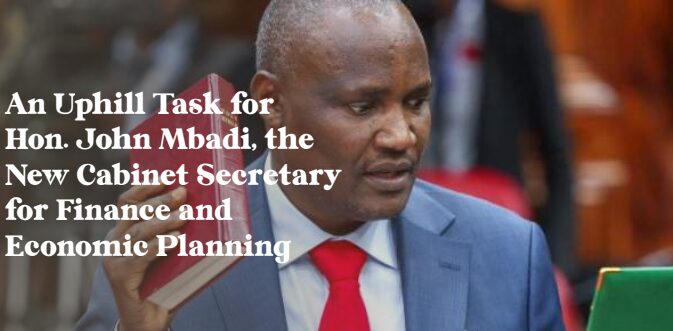An Uphill Task for Hon. John Mbadi, the New Cabinet Secretary for Finance and Economic Planning

Of the new Cabinet sworn in August 8, perhaps none has a more difficult and uphill task than John Mbadi, the man newly in charge at the Ministry of Finance and Economic Planning.
The chairman of the Orange Democratic Movement faces several challenges at a unique time at the Treasury Building, such as the collapse of this year’s Finance Bill and the annulment by the court (since appealed) of the Finance Act, 2023.
There are also pending court matters against the Appropriations Act 2024, based on the fact that it has no standing without the Finance Bill 2024.
The withdrawal of the Finance Bill 2024 presents significant challenges for Mr John Mbadi in meeting the budgetary demands, as he faces a Kshs 510 billion gap that needs to be addressed. Additionally, the unconstitutional Finance Act 2023 will necessitate a government-wide technological update to reflect the proper tax rates. The Supreme Court has so far declined to issue a stay on the Court of Appeal’s ruling on the Finance Act 2023, making that option feasible.
Beyond legal challenges, the global geopolitical landscape is rapidly evolving. If the current conflict in the Middle East escalates as it is threatening to do, it could disrupt global financial markets, while the outcome of the upcoming U.S. elections later this year may signal further changes.
During his vetting, Mr Mbadi discussed the country’s complex fiscal situation, including mounting debt and suggested that the debt register is made a public document to allow taxpayers to see the finer details of the country’s debt. In addition, he proposed making debt accountability a statutory requirement to ensure transparency about the debt details. He also suggested restructuring debts to reduce the proportion of commercial debt and balancing the cost of domestic and external debt. He advocated for linking loans directly to specific projects to ensure they fund value-adding initiatives and manage debt repayment effectively.
He also proposed enhancing the efficiency of the Kenya Revenue Authority (KRA) through capacity building, system updates, and improved recruitment and training processes. He said he would target to increase tax revenue from 14% to 18% of GDP to reduce the fiscal deficit.
While it may all have been rhetoric during the vetting, today it all becomes a reality he must contend with.
Mr Mbadi is an accountant by profession, who worked at the University of Nairobi before working for Medair as a Finance Director. His parliamentary work in various budget-related committees may serve him well, having been a member of the Public Accounts Committee, Budget and Appropriations Committee and the Public Investments Committee. He also has a firm grasp of the Public Finance Management Act and the principles it is based on. However, he will also need to navigate the intricately complex web of a broad-based government, given that he is drawn from the opposition.
The next Finance Bill will face intense public scrutiny and the imposition of new taxes will be opposed during public participation with the public willing to go to the courts. Parliament will also have to follow the proper public participation norms to avoid being taken to court.
Prof. Njuguna Ndung’u, his predecessor, approached his task as a professor, carrying out economic studies on various taxes before undertaking any economic decisions.
Like Prof Njuguna before him, Mr Mbadi will also have to contend with the fact that unlike his predecessors, President William Ruto is advised by a Council of Economic Advisers, headed by Dr David Ndii. The President also has at his disposal the technocrats and bureaucrats at Treasury Building, who have the institutional memory as well as the hands-on experience of running Treasury. While he interrogated past expenditure at the Public Accounts Committee and interrogated set budgets at the Budget and the Finance Committees, Mr Mbadi is expected to be in the driving seat at Treasury, making decisions and proposals, and defending them when the time comes.

